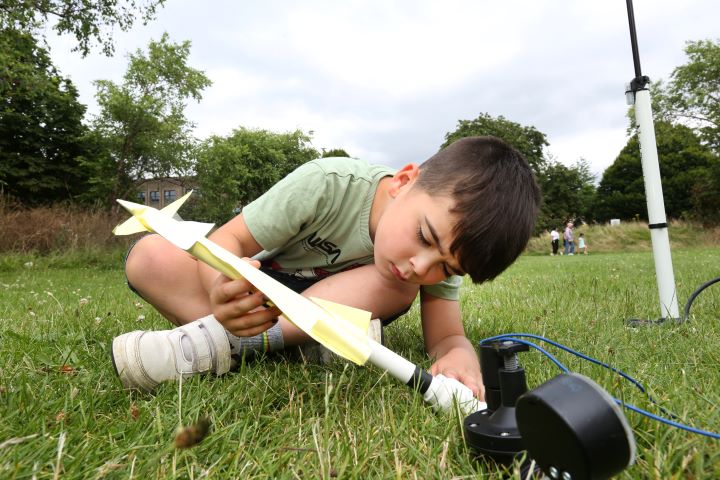What if we could smell the solar system, listen to a shooting star, or even feel the vibrations of a Mars-quake? These were just some of the fascinating ideas put to space enthusiasts – young and old – as part of the Bright Sparks family event series, which took place at Lakeside Arts on Saturday 20 July.
In his interactive and sensory talk, Jez Turner, Associate Professor in the Department for Foundation Engineering and Physical Sciences, explored how most of our solar system and the universe is not just what we see with visible light.
The audience enjoyed a delight to the senses with the opportunity to create their own space rockets, hold and smell meteorites older than the earth and climb inside the 'Inflativerse' to experience the sights and sounds of the University of Nottingham's mobile planetarium.
Through lively practical demonstrations which delighted the audience, Jez also revealed how we can explore space through smell, touch and sounds. Smelly comets and rainbow rockets were on show, while visitors heard how black holes collide, felt how a satellite moves, and saw how a snake or other animals see the night sky.

"Our senses are essential in helping us understand and experience the world around us. Looking up at the night sky is a valuable way we can all make a connection to what's out there in our universe. But visible life is a just a minute part of the way we study the universe, we can also learn a great amount through touch, taste, sound and smell."
Joining Jez for the sold-out event was Professor Martin Bencsik of Nottingham Trent University who demonstrated a spectral analysis of sounds from space.

The event, Exploring our Universe, which fittingly took place on the 55th anniversary of the Apollo 11 moon landing, was part of the Bright Sparks family talk series, which features engaging lectures by enthusiastic academics from the University of Nottingham, who are eager to share their research and passions with family audiences. These events form part of the University's wider public engagement activities supported by the Institute for Policy and Engagement, focusing on supporting Nottingham's journey to be recognised as a UNICEF child friendly city by making academic research accessible to all ages.






